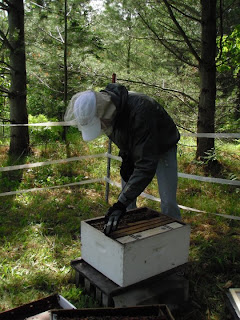A few days ago I watched a documentary about bees and colony collapse disorder called Vanishing of the Bees. It is a great documentary about some of the recent problems that bees have been experiencing, and as someone with experience as a bee keeper I was especially interested.
 With some of my bees
With some of my beesBees are an indicator species because they are especially vulnerable to small changes in their environment. In addition, more than 1/3 of our food is pollinated by bees and they contribute 10's of billions of dollars to the agricultural industry in the USA alone. A decline in the bee population can and will be felt up and down the food chain.
Right now bees are in decline around the world, and scientists don't know why. Some of the main culprits for the so called colony collapse disorder include over feeding and poor nutritional quality in the commercial feed large scale bee keepers feed their bees, Queen supplementation and replacement some large bee keeping operations undertake to increase hive production, and the mono culture agricultural system that currently dominates world food production.
 A brood box on my hive
A brood box on my hiveThis information is interesting and provides a scary outlook for the future of bees and our food system, but it should not altogether be unexpected. When I look at those three possible root causes of colony collapse disorder I can see parallels to human life and athletic training. (And I know what you are thinking - you can connect any two random ideas if you try hard enough, but just hear me out)
Colony collapse disorder cause one - over feeding/poor nutrition. Without proper nutrition humans are shortening their lives and becoming susceptible to diseases like heart disease, cancer, diabetes, and more. In the athletic world poor nutrition can hinder performance and or recovery. Without proper nutrition humans - and bees - become weaker over time.
Colony collapse disorder cause two - Queen supplementation and forced over production. By neglecting recovery or forcing our bodies to adapt to training too quickly we can sometimes see short term gains, but in the long run we almost always bottom out. Our bodies fail to continue to perform at the level we desire and force us to rest and recover. This is classic over training. Bees too many be experiencing this after generations of breading to produce more honey, faster pollination, and faster colony expansion is their "over training" catching up with them?
Colony collapse disorder cause three - mono culture food systems. When we get into a rut with our training our bodies take notice. They adapt to running that one favorite loop really well, but are not always fit to take on the challenge of other roads or trails or even different weather conditions. This is part of the benefit of mixing in new stresses to your training. You keep the body adapting to new situations and progressing. Like wise, bees may be suffering from a mono culture slump due to the human system of producing lots of the same kinds of food in close geographic relation to each other. Although this might be efficient for an "industrial food complex", this is not good for the environment. It makes it easy for pests and diseases to wipe out entire crops (think Irish potato famine!)and makes important pollinators, like bees, unable to quickly adapt to new threats. Don't fall into the mono culture training rut!
I hope that when thinking about the complex issue of colony collapse disorder in terms of these three basic principals you might be able to understand the issue more clearly and avoid some common pit falls of endurance training.
Happy training, and next time you see a bee out on a pollen finding mission give it a little thanks. or better yet, join me in becoming a bee keeper/steward of our food system!






No comments:
Post a Comment